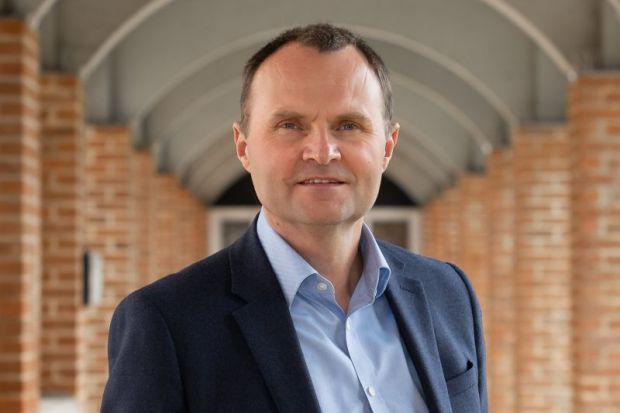Adam Tickell is returning to the University of Birmingham as vice-chancellor, five years after leaving to lead the University of Sussex.
Professor Tickell, who had a five-year spell at Birmingham between 2011 and 2016 as provost and vice-principal, and pro vice-chancellor (research and knowledge transfer), will join the Midlands institution in January 2022.
He will succeed Sir David Eastwood, who has led Birmingham since 2009 and will retire at the end of the year.
Professor Tickell is an influential voice on higher education policy, currently leading a review of research bureaucracy in the UK for the Westminster government and having previously played a key role in negotiations over the future of sector pensions provided by the Universities Superannuation Scheme (USS). The economic geographer was previously vice-principal (research, enterprise and communications) at Royal Holloway, University of London.
Mervyn Walker, chair of council at Birmingham, said that Professor Tickell had “an impressive track record of leadership in higher education”.
“He brings a combination of clear strategic vision, a collegiate leadership style, intellectual credibility, a depth and breadth of academic understanding, and genuine national influence: qualities that the selection committee felt would be invaluable to lead the university in its aspiration to become a global top 50 university,” Mr Walker said.
At Sussex Professor Tickell pledged to “focus on redefining the distinctiveness of the university for the 21st century” and to tackle a culture of bullying and discrimination.
He is now taking the helm of a bigger and more prestigious institution, but one that still has challenges to address: earlier this year staff at Birmingham threatened to take industrial action over a proposed career framework that they claim will require new starters to reach senior lecturer within five years or face disciplinary action that could lead to dismissal.
Sir David, as chair of the USS, became a lightning rod for criticism from academics and unions during several rounds of industrial action over reforms to contributions and benefits, and also faced criticism over his remuneration, which was consistently one of the highest in the UK and totalled £450,000 in 2018-19.
Birmingham told Times Higher Education that it would publish details of Professor Tickell’s remuneration “via the university’s annual accounts, as is usual practice in the sector”.
Mr Walker said that under Sir David, “the research, education, civic mission, and global influence of the university have been transformed”.
Professor Tickell said that he was “thrilled” to be returning to Birmingham.
“Although the backdrop for universities is challenging, Birmingham is very well-placed to thrive,” Professor Tickell said. “It has been led exceptionally and has real academic strength, outstanding facilities and opportunities for students, state-of-the-art research facilities, and strong collaborations.
“My ambition is for Birmingham to be known as the most innovative, vibrant and exciting place to work or study in the UK.”
Register to continue
Why register?
- Registration is free and only takes a moment
- Once registered, you can read 3 articles a month
- Sign up for our newsletter
Subscribe
Or subscribe for unlimited access to:
- Unlimited access to news, views, insights & reviews
- Digital editions
- Digital access to THE’s university and college rankings analysis
Already registered or a current subscriber? Login








